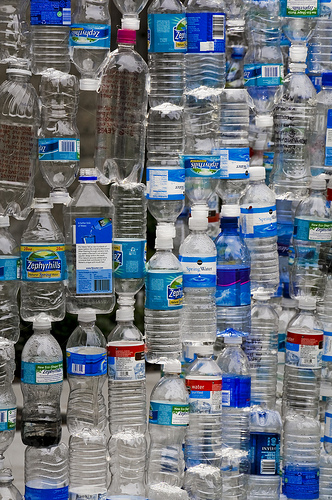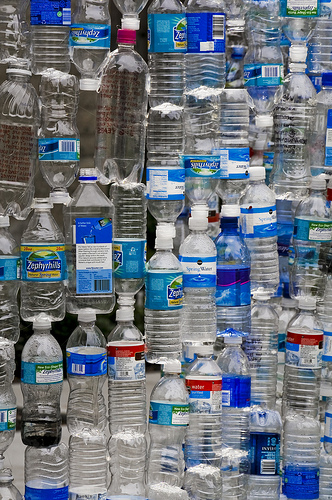Send your question to Umbra!
Q. Dearest Umbra,
We and our colleagues use sparkling water as our substitute for cokes, coffee, beer, etc. We have heard some really bad things about bottled water, and are of course aware of the fact that it is up to 10,000 times more expensive than tap water. But oh those sparkles … can you share your astute opinion and a comparison of the brands of sparkling waters with us? (Our favorite happens to be La Croix.) We’re pro-rivers and clean water, but we don’t want to steal other people’s.
Cheers,
Liz and Cindy
Alabama
A. Dearest Liz and Cindy,
The associated problems with bottled water are — no, let’s start with the positive aspects of bottled water, both still and sparkling. It comes in an easy-to-carry package, often perfectly shaped to fit the human hand. It is readily available, chilled, at a store near you. Um — well, bottled sparkling water is much easier to obtain than tap sparkling water. Plus, it tickles your nose.
 Scam I am.fhemerick via flickrBottled water in general is nothing more than a massive marketing success. (And how about ‘vitamin’ water? What a brilliant scam.) It is water, in a bottle, sucked out of the 1 percent of the planet’s water that is drinkable, processed by some global subsidiary, trucked to your town and sold to you at a hilarious markup. These people are raking it in. If we read, in a 1907 novel, about some guy standing on the sidewalk hawking water in bottles, the character would be depicted as a charlatan. Today a bottle of water is an unremarkable accessory and no one is laughing.
Scam I am.fhemerick via flickrBottled water in general is nothing more than a massive marketing success. (And how about ‘vitamin’ water? What a brilliant scam.) It is water, in a bottle, sucked out of the 1 percent of the planet’s water that is drinkable, processed by some global subsidiary, trucked to your town and sold to you at a hilarious markup. These people are raking it in. If we read, in a 1907 novel, about some guy standing on the sidewalk hawking water in bottles, the character would be depicted as a charlatan. Today a bottle of water is an unremarkable accessory and no one is laughing.
The broad issues covering all bottled water certainly apply to your sparkly bevvie. To start with the immediately scary: both the Natural Resources Defense Council and the Environmental Working Group have studied bottled waters and found, among other things, that they are unregulated, are often just packaged tap water (label images to the contrary), and often violate safe drinking water standards and/or contain chemicals used in plastics manufacture. And yes, you are taking someone else’s water, and causing it to be shipped to you at the climate’s expense.
As for the bottles themselves, a tidbit via previous Gristy post indicates that manufacturing a plastic water bottle necessitates using three times as much water as the actual capacity of the bottle. After all these years, can I simply remind us that disposable plastic is not so good, without reiterating why?
Processed beverages make big money. They are mostly water, oft mixed with sugar, carbon, and flavor. Cheap to make, great to sell. Large corporations are very interested in owning any bottled water label that succeeds in the marketplace. So, to answer your specific question, all you need to do is find out what corporation owns a brand, then look it up on a site such as Coop America. I also found a water list on Ethical Consumer.
This amazingly helpful advice doesn’t really work with LaCroix, which is owned by the National Beverage Company, a second-tier company that gets less attention than Nestle and PepsiCo. But we don’t really need to rank brands, because we know this: all bottled-water brands are silly, overpriced, and hurting the planet.
All that said, I must admit that I too love the sparkly water on occasion, and I do not blame youse for your habit. Try drinking less of the bottled stuff, and consider getting a tap-water carbonating device for your office.
Effervescently,
Umbra



